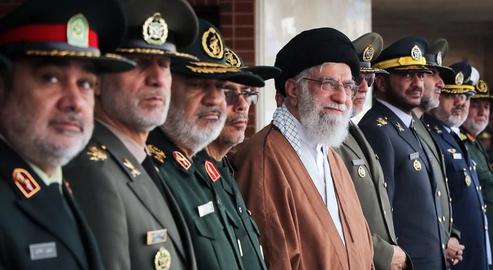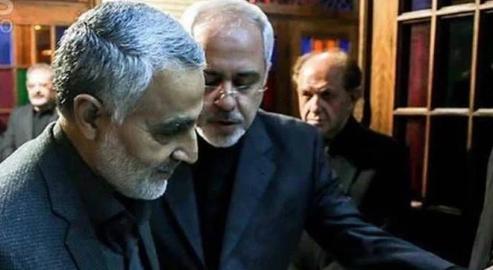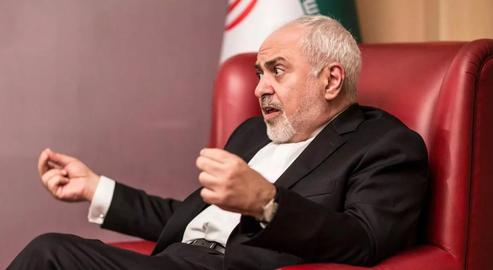If nothing else, the 42-year history of the Islamic Republic leaves little doubt that Foreign Minister Mohammad Javad Zarif is going to pay heavily for his recent leaked interview.
The most important takeaway from this three-hour recorded discussion was his detailed portrayal of the Revolutionary Guards’ total dominance over the government of the Islamic Republic and its impact on the lives of Iranians.
The interview, it has since been reported, was part of a project by Zarif to record an “oral history” of the Iranian diplomacy over the past eight years.
***
In the recording, Zarif became the first government official to reject the notion of “dual sovereignty”: the fantasy of joint rule by Iran’s appointed and elected bodies.
Such a thing, Zarif said, does not exist in Iran, and whatever does exist is in the service of the “battlefield”: his shorthand for the exigencies of the Revolutionary Guards and Iran’s security forces.
Zarif also revealed extensive new and first-hand information about the role played by General Ghasem Soleimani, the commander of the Guards’ expeditionary Quds Force, who was assassinated by an American drone in January 2020.
He claimed that in their weekly meetings, Soleimani would always ask him to include certain topics in the negotiations. For instance, Soleimani apparently wanted Zarif to ask Russian Foreign Minister Sergei Lavrov to take action to help his military victory in Syria. But he never reciprocated when Zarif had a request.
Zarif also described many other points of disagreement with Soleimani. For one thing, he said, Soleimani was using the civilian airline Iran Air for military and arms deployments to Syria. “I asked him not to use Iran Air flights to Syria [for military purposes]”, says Zarif. “But he said Iran Air was safer than Mahan Air".
The US sanctions on Iran Air were lifted as part of the JCPOA. But, Zarif said, US Secretary of State John Kerry had asked him why the number Iran Air flights to Syria had increased sixfold. When Zarif asked Minister of Roads Abbas Ahmad Akhoundi about it, he had apparently said that he knew nothing about it. Under President Trump, of course, Iran Air was sanctioned again.
Covering Up the Downing of the Ukrainian Passenger Plane
One the most shocking parts of the interview referred to the regime’s attempted cover-up of the downing of Ukrainian Airlines Flight 752 over Tehran on January 8, 2020. The passenger jet was shot down by two Revolutionary Guards surface-to-air missiles, killing all 176 people onboard.
Zarif claimed that two days after the downing of the plane he was invited to a meeting of the Supreme National Security Council. Council secretary Rear Admiral Ali Shamkhani, the Revolutionary Guards’ General Mohammad Bagheri, the Chief of Staff of the Armed Forces, and Minister of Roads Mohammad Salami were the only others present.
Zarif said that this group knew everything about the downing of the plane. But when he told them that the world was demanding an explanation, he claims, the two generals attending the meeting attacked him and told him to send out a tweet denying that the plane had been hit by missiles. When he protested, he said, “With God as my witness, the way they reacted was as if I had denied the existence of God.”
In the afternoon of the same day, Zarif claimed, another meeting of the Supreme National Security Council was held in the presence of President Rouhani. There, the generals finally succeeded in having their own version of events foregrounded in the statement that was later issued by the Islamic Republic on behalf of the armed forces. It took three days for the Guards to admit that it was their missiles that had brought down the plane.
Zarif Was the Last to Know
Zarif also claimed that when Iran decided to retaliate against the assassination of General Soleimani, two Quds Force commanders had met with the Iraqi prime minister, Adel Abdul Mahdi, to inform him that Iran was going to launch a missile attack on a US military base 45 minutes before it was to take place. But for his part, Zarif says, he was informed of the attack a full day later, meaning both the Iraqis and America knew about it before he did.
Zarif said he was astonished when John Kerry told him that Israel had attacked Iranian positions in Syria at least 200 times. General Soleimani, he said, had not told him anything about this in their weekly meetings. Similarly, he claimed that Syrian President Bashar al-Assad’s 2019 visit to Tehran had been a joint plan hatched by him and Soleimani but, when it happened, he only learned about it after he saw it on TV.
Zarif might not be among Ayatollah Khamenei’s favorite politicians. But up to a point, the Supreme Leader trusts him to guide the Islamic Republic through the minefield of foreign relations. The regime lacks any other figure that Khamenei can trust at a similar level, and that is why Zarif has remained in post for the past eight years despite the demonstrable opposition of the Revolutionary Guards and security elements close to Khamenei’s staff.
His statements about the absolute power of the Revolutionary Guards are likely to infuriate those in the IRGC rank and file, as well as the more ardent fans of the late General Soleimani. In the interview, Zarif also made it plain that he was unhappy that the dominance of the “battlefield” over diplomacy had taken away some of his own popularity, bestowing it instead on Soleimani.
Up until now, Ayatollah Khamenei has protected Zarif from his powerful detractors in the Revolutionary Guards through equivocal public statements. But now, Zarif’s opponents have heard his candid views about Soleimani and the Guards from his own mouth. From now on Khamenei is likely going to have a harder time controlling those elements that already disliked the incumbent Foreign Minister.
In addition, and also for the first time, Zarif said frankly that Russia had followed policies that harmed Iran’s interests, and that Moscow was against the normalizations of relations between the Islamic Republic and the West.
Russia had been a party to the nuclear negotiations, and Zarif explicitly stated that Russian Foreign Minister Sergei Lavrov had done his best to prevent the signing of the JCPOA. This included by opposing the continuation of uranium enrichment in Iran and the lifting of the UN Security Council sanctions. Ultimately, when it was signed, Zarif said Russia was then helped by Soleimani in efforts to prevent its successful implementation.
When Soleimani traveled to Russia in mid-2015, he was still on the UN Security Council’s sanctions list. His name was only removed close to one year after his assassination. The main reason for the US exit from the JCPOA was Soleimani’s operations in Iraq, Syria and Yemen, and the Quds Force’s policies in the region.
What Next?
Now that Zarif has publicly complained about Russia’s policies towards Iran, and has explicitly named Putin and Lavrov as opponents of the JCPOA, it is difficult to imagine how he will be able to negotiate and work alongside Russia in the manner that he did before.
During his eight-year tenure as foreign minister, Zarif has visited Russia more than any other country. But he was wary of Russia long before then, even while serving as the Islamic Republic’s ambassador to the UN. In one interview during that period, Zarif said Russia could ruin the future of Iranian representatives in New York simply by, for instance, manipulating a picture and placing a glass of wine next to them.
The inevitable reaction from the Revolutionary Guards, Russia’s likely displeasure and, of course, Khamenei’s diminished approval all mean that Zarif will now not have an easy time in his remaining months as foreign minister – that is, if he is not deposed before then. By Sunday night, some of Zarif’s critics were already calling for his resignation, claiming that he had endangered Iran’s national security.
Such an outcome might not be favored by Ayatollah Khamenei, especially in the middle of negotiations to lift sanctions. But in the end, even the Supreme Leader might be forced to give in to Zarif’s opponents.
Related Coverage:
Zarif Blames Russia and the Guards for Harming the JCPOA in Leaked Interview
IranWire Exclusive: Javad Zarif is "Frustrated" With the Guards and the Government
Guards Commander Rebuked by Diplomats for Confirming Iran’s Military Presence in Yemen
Iran’s President and Foreign Minister Knew the Guards Shot Down Passenger Plane
Zarif Says Truth of Downed Ukrainian Plane May 'Never be Revealed' in Leaked Audio File
visit the accountability section
In this section of Iran Wire, you can contact the officials and launch your campaign for various problems




























comments